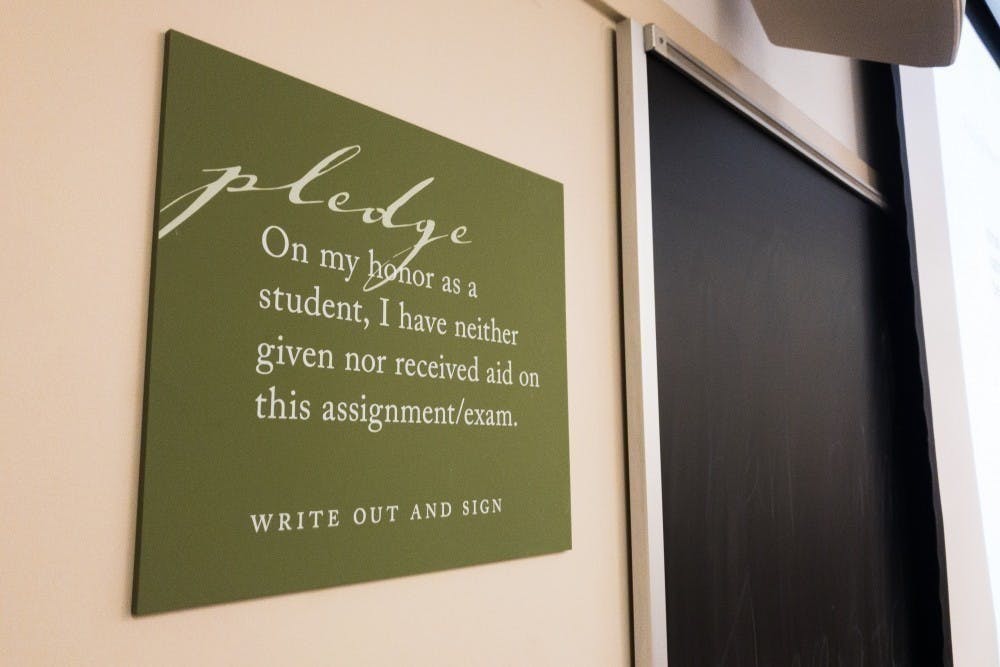Last week, Viewpoint Writer Adam Grim published a column advocating for the Honor Committee’s removal of expulsion as a sanction for Honor offenses. Grim questions if and why expulsion is ever merited, and if the Informed Retraction actually does anything to preserve the University’s Community of Trust. The argument is plagued by a spectacular misunderstanding of the Honor Committee, its procedures and its sanctions. Grim mistakenly flattens the nuances of the system and misattributes blame for inequity in sanctions. Many — if not all — of the issues Grim cites can be traced back not to the consideration of expulsion as a sanction, but expulsion as the single sanction.
The core misunderstanding is a conflation of expulsion and the single-sanction. Under the current single-sanction system, a guilty verdict results in the automatic expulsion of the student. There is no separate hearing for determining punishment once a student is found guilty. And while the current single-sanction system is unconscionably inequitable — low-income students may have federal financial aid revoked and international students may have student visas cancelled, among other consequences — the issue is not that expulsion is considered. The issue is that only expulsion is the only sanction considered.
A movement to one of the many multi-sanction systems, as described in the Honor Committee’s 2015 Multiple Sanction Honor Systems Report, would resolve these issues of injustice. Honor offenses are highly complex subjects involving both a student’s personal situation and academic history. Treating them as simple, cut-and-dry instances of dishonesty is a disservice to the community. Additionally, students and faculty otherwise deterred from reporting because of an unease with the single-sanction would be able to report with the confidence that due process will be taken and a just sanction will be enforced.
Grim also questions whether or not Honor convictions even merit expulsion, but the answer could not be clearer. The University is the fourth-best public university in the nation. Students from all 50 states work tirelessly throughout their four years of high school to get a spot here. Once on Grounds, they spend their time here striving for social change, technological innovation and cultural richness. Any student willing to knowingly lie, cheat or steal to get an unfair advantage of any kind — with such blatant disregard for their own academic or social integrity — irreparably harms the Community of Trust. And while I strongly support the move to a multi-sanction system, some offenses will be so egregious that expulsion must be considered. Removing expulsion from the equation discounts the standard of integrity every student at the University ought to be held to.
On the subject of the Community of Trust, Grim contends that the IR negates Honor’s efforts to maintain a healthy community. The IR allows students to “plead guilty” once made aware of a report against them, rather than face a full trial. Students who take an IR agree to a two-semester suspension, but are then allowed to return to the University to finish their studies. Grim argues IR students still taint the Community of Trust upon their return. But IR students understand that their actions were morally wrong and harmed the Community of Trust. They are allowed to return because they have retroactively acknowledged the error and agree to learn from the mistake. The IR is not a glitch within the system, but rather a tool of forgiveness, a reward for honesty and a facilitator of moral growth. While the IR would prove an insufficient mode of rehabilitation in a multi-sanction system, its existence in the current single-sanction system does not constitute an oxymoron.
The article concludes, “The alleged benefits of the Honor system — unproctored exams, take-home exams, professors believing excuses — do not require the penalty of expulsion.” He is correct — these “alleged benefits” do not require expulsion as a sanction for lying, cheating or stealing. But the exceptional academic standing of the University — the standard of integrity we hold ourselves to — demands it. Honor must maintain expulsion as a sanction, but it must move away from a single-sanction system. As the University becomes increasingly diverse, it becomes ever-apparent that each student’s situation is unique. A guilty verdict cannot result in eternal banishment from the University. Honor cannot continue to operate blind to the life-altering effects the single-sanction has on students.
Noah Strike is an Opinion Columnist for The Cavalier Daily. He can be reached at opinion@cavalierdaily.com.
The opinions expressed in this column are not necessarily those of The Cavalier Daily. Columns represent the views of the authors alone.







